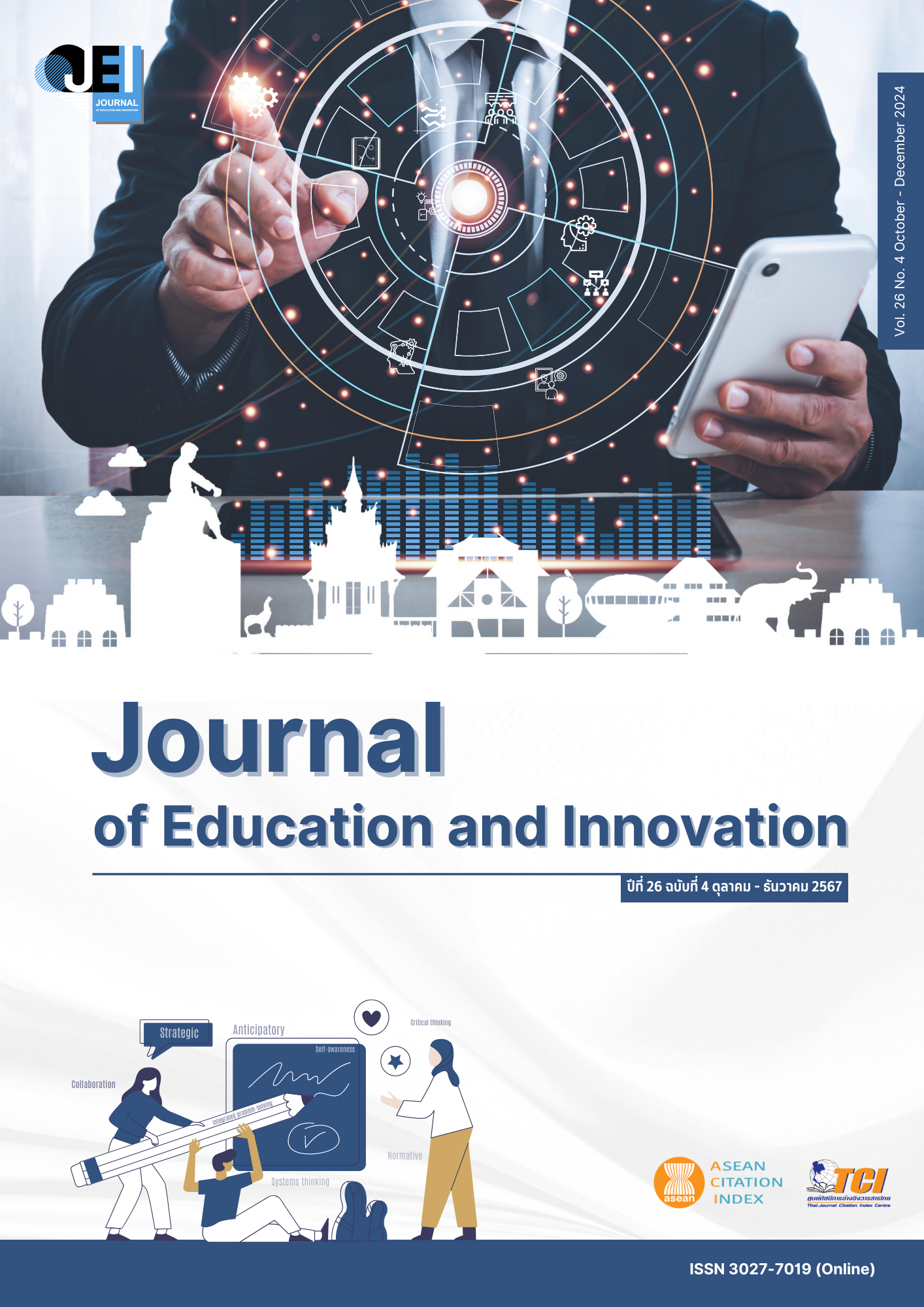DEVELOPMENT OF A TRAINING COURSE TO PROMOTE NON-COGNITIVE SKILL USING PROBLEM-SOLVING LEARNING FOR AUTOMATION CONTROL
Main Article Content
Abstract
The research on this was to 1) develop a training courses to promote non-cognitive skill, 2) to find the index of the effectiveness of learning achievement training courses to promote non-cognitive skills, 3) assess the skills that learners demonstrate during learning, and 4) to study the students’ satisfaction toward with that learned the training courses to promote non-cognitive skills using problem-solving learning for automation control. In this research, learning materials were evaluated by 12 experts from both educational and engineering fields. The samples were 30 students based on purposive sampling chosen from undergraduate students who were interested in automation. The data were collected by through observation, interviews, tests, and questionnaires. The data analysis was based on frequency, percentage, effectiveness index, t-test, and content analysis. The research results are shown as follows : 1) the development of a training courses to promote non-cognitive skill using problem-solving learning for automation control comprised of : principles and background, curriculum objectives, contents and learning experiences, activities, media and learning resources, and assessment and evaluation, the assessing the suitability of the training curriculum by the experts was found the developed curriculum was highly suitable, 2) learners who followed the designed learning model has higher learning achievement as 80% in average and learning based on the designed learning model has gained the learning knowledge of learners significantly at .05 level of significant, 3) the programming skills of learners demonstrated the good level, and 4) the students opinion for training courses to promote Non-Cognitive skill using Problem-Solving Learning for automation control overall was at high level.
Article Details

This work is licensed under a Creative Commons Attribution-NonCommercial-NoDerivatives 4.0 International License.
The owner of the article does not copy or violate any of its copyright. If any copyright infringement occurs or prosecution, in any case, the Editorial Board is not involved in all the rights to the owner of the article to be performed.
References
Aldous, C. R. (2019). Unlocking creativity in solving novel mathematics problems: Cognitive and non-cognitive perspectives and approaches. Routledge.
Ashima, R., Haleem, A., Bahl, S., Javaid, M., Mahla, S. K., & Singh, S. (2021). Automation and manufacturing of smart materials in additive manufacturing technologies using internet of things towards the adoption of Industry 4.0. Materials Today: Proceedings, 45, 5081-5088.
Bonk, C. J., & Graham, C. R. (2012). The handbook of blended learning: Global perspectives, local designs. John Wiley & Sons.
Dotoli, M., Fay, A., Miskowicz, M., & Seatzu, C. (2019). An overview of current technologies and emerging trends in factory automation. International Journal of Production Research, 57(15-16), 5047-5067.
Egarievwe, S., Ajiboye, A., Biswas, G., Okobiah, O., Fowler, A., Thorne, S., & Collins, W. (2000). Internet Application of LabVIEW in Computer Based Learning. EURODL.
Glazewski, K. D., & Ertmer, P. A. (2020). Fostering complex problem solving for diverse learners: engaging an ethos of intentionality toward equitable access. Educational Technology Research and Development, 68(2), 679-702.
Heliawati, L., Afakillah, I. I., & Pursitasari, I. D. (2021). Creative problem-solving learning through open-ended experiment for students' understanding and scientific work using online learning. International Journal of Instruction, 14(4), 321-336.
Ismail, F. K. M., & Zubairi, A. M. B. (2022). Item objective congruence analysis for multidimensional items: content validation of a reading test in Sri Lankan University. English Language Teaching, 15(1), 106-117.
Jitpiromsri, A. (2021). The factors of knowledge, attitudes, and trends towards the internet of things (IoT) of the technology users in Bangkok Metropolitan and Vicinity. Siam Communication Review, 20(2), 45-62.
Johari, J., Ahmad, A., Madzhi, N. K., Buniyamin, N., & Kassim, R. A. (2017). LabVIEW as an effective tool for problem-based learning in undergraduate engineering education. In 2017 IEEE 9th International Conference on Engineering Education (pp. 169-173). IEEE.
Khongyoo, D., Toopsuwan, C., & Phaksunchai, M. (2024). A study of students’mathematical problem-solving skill and satisfaction through mathematics camp activity using sscs model and bar model on ratio, proportion, and percentage. Journal of Education and Innovation, 26(1), 1-14.
Marino, G. N. (2019). Certified to lead. Mechanical Engineering Journal, 131(8), 32- 33.
Miyagawa, Y., Kanemasa, Y., & Taniguchi, J. (2023). A compassionate and worthy self: Latent profiles of self-compassion and self-esteem in relation to intrapersonal and interpersonal functioning. Current Psychology, https://doi.org/10.1007/s12144-023-05428-w
Munawaroh, I. H. (2022). Development of E-LKPD based on the SSCS (Search, Solve, Create, and Share) Model in science lessons for class V students in elementary school. Elementary School: Jurnal Pendidikan dan Pembelajaran ke-SD-an, 9(2), 121-125.
Panichsakulchai, P., Suyaprom, S., & Suklueang, K. (2022). Development of skilled labor of Thai engineers for competition in the ASEAN economic community. Journal of MCU Social Science Review, 11(4), 240-253.
Pogatsnik, M. (2019). The impact of dual higher education on the development of non-cognitive skills. In search of Excellence in Higher Education (pp. 179-190). Budapest: Corvinus University of Budapest Digital Press.
Kantathanawat, T. (2020). Integrated active learning management model via virtual classrooms to enhance growth mindset and learning achievement on learning psychology. Journal of Research and Curriculum Development, 10(2), 146-156.
Waichompu, N., Chullasap, N., & Nawsuwan, K. (2021). Applying the DISC Concept to Drive Administration within Education Institutes. Journal of Education and Innovative Learning, 1(3), 301-310.


